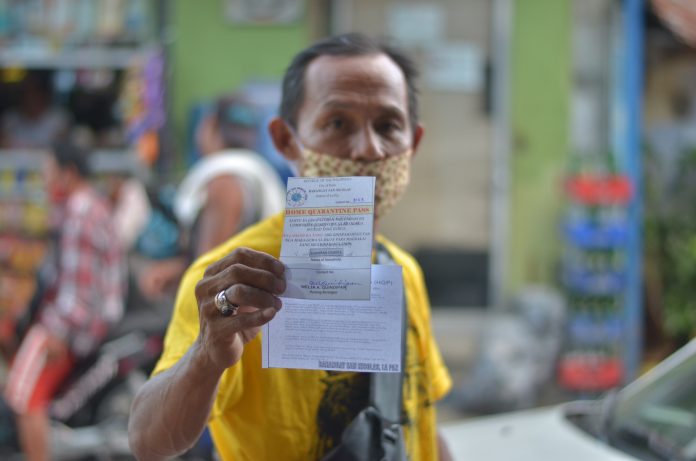
ILOILO City – Residents of this city must bring with them their quarantine pass and present this to authorities every time they go out of their houses during this period of enhanced community quarantine. Authorities are mandated to prevent anyone from leaving their houses without such pass, stressed Mayor Jerry Treñas.
This quarantine protocol is “a response mechanism to prevent the spread/or local transmission” of SARS-CoV-2, the virus that causes the coronavirus disease 2019 (COVID-19), Treñas stated in Executive Order (EO) No. 064 issued yesterday.
“There is a need to impose and require the presentation of the Barangay Quarantine Pass for persons moving within Iloilo City for the period of the Enhanced Community Quarantine from March 20, 2020 at 12:01 a.m. until April 30, 2020 at 11:59 p.m.,” he stressed.
The quarantine pass must be presented when going out of the house to either buy food or basic commodities, or go to the hospital or pharmacies within Iloilo City, and/or entering the borders of the city.
“Ang quarantine pass ginahatag one per household. Gina-limit naton ang mobility. We do not want everyone to be out in the streets,” said Treñas.
He ordered the Philippine National Police, Philippine Army, Iloilo City Public Safety and Traffic Management Office, barangay officials and all other persons tasked to maintain peace and order within the city to enforce the quarantine pass protocol.
Those not following this protocol may be charged with endangering the lives of city residents, said Treñas.
Republic Act No. 11332 made it the “policy of the State to protect and promote the right to health of the people, and (it) shall endeavor to protect the people from public health threats” such as epidemics “which can undermine the social, economic, and political functions of the State.”
Treñas also cited Section 5-2.4 of Department of Interior and Local Government Memorandum Circular No. 2020-062 stating: “(The local government unit) shall implement strict home quarantine. This shall be enforced by local government units in all households within their jurisdiction. Movement shall be regulated through the issuance of gate passes to designated individuals per household. Further, such movement shall be limited to accessing basic necessities, and provision for food and essential health services.”
WEEKEND LOCKDOWN
On April 13 Treñas issued EO No. 063 further strengthening the quarantine by ordering a weekend (Saturday and Sunday, April 18, 19, 25, 26) lockdown. Only hospitals and pharmacies would be operating; businesses and offices of any other nature must be closed.
A day after, however, Treñas amended his EO after some sectors made an appeal.
Under the amended EO, other essential establishments, especially those involved in food, including sari-sari stores, supermarkets, convenience stores, and talipapas, would be allowed to operate but for a maximum of six hours only – from 9 a.m. to 3 p.m.
Also, these establishments must require patrons to wear facemasks and bring their quarantine pass, and accommodate their last customers 30 minutes before 3 p.m.
By 3 p.m., no one would be allowed to go out of their houses except those exempted.
“Supermarkets should have vehicles to transport their workers,” said Treñas.
Other establishments and businesses allowed to operate are the following:
* business and knowledge process outsourcing companies – must comply with Department of Trade and Industry Memorandum Circular No. 20-14-2020 dated April 11, 2020
* media outlets – must secure media pass from the city government
* financial institutions (banks, money transfer services, payment and remittance centers) but only from 9 a.m. to 1 p.m.
* restaurants, fast food chains and the like – but take-out and delivery services only, and must close by 3 p.m.
* gasoline stations, laundry and water refilling stations – only until 3 p.m.
* slaughterhouse, fishing port operations, arrastre, cargo, logistics (including hauling, transport and storage), warehouse operations, delivery of basic commodities, supplies, food manufacturing, commissaries, food deliveries, utilities (water, electricity, telecommunication, cable television, fuel/diesel/gasoline, LPG, kerosene, and other similar or related goods and services)
As to movement restrictions, the amended EO stipulates that no person shall be allowed to go out of their houses except:
* those who need to go to either hospital or pharmacy, provided they have a quarantine pass and wear facemask
* all Department of Health personnel (officials and staff)
* healthcare workers (doctors, nurses, all hospital staff and personnel, provided they present a valid identification cards)
* uniformed and volunteer personnel (from the police, military, fire bureau, coastguard, Red Cross, and those manning COVID-19 checkpoints)
* security and augmentation personnel
* Iloilo City Government personnel (members of Iloilo City COVID-19 Team, Iloilo City Community Kitchen, Iloilo City Emergency Response Team, Public Safety and Transportation Management Office, City Disaster Risk Reduction and Management Office, Sanitation)
* barangay officials
* employees of public utilities and related industries
* personnel engaged in the production, preservation, storage and manufacture of food, water, goods and commodities and other basic necessities
* those working in banks and financial institutions
* media practitioners
* other such essential personnel recommended by the COVID-19 Focal Person, and approved by the city mayor/PN




